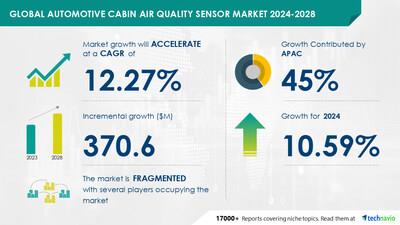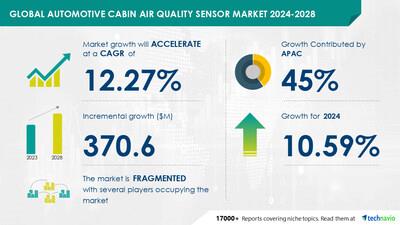
Automotive Cabin Air Quality Sensor Market To Grow By USD 370.6 Million From 2024-2028, Driven By Rising Pollution Awareness, AI Powered Report- Technavio
| Automotive Cabin Air Quality Sensor Market Scope |
|
| Report Coverage |
Details |
| Base year |
2023 |
| Historic period |
2018 - 2022 |
| Forecast period |
2024-2028 |
| Growth momentum & CAGR |
Accelerate at a CAGR of 12.27% |
| Market growth 2024-2028 |
USD 370.6 million |
| Market structure |
Fragmented |
| YoY growth 2022-2023 (%) |
10.59 |
| Regional analysis |
APAC, Europe, North America, South America, and Middle East and Africa |
| Performing market contribution |
APAC at 45% |
| Key countries |
China, US, Japan, India, and Germany |
| Key companies profiled |
Amphenol Corp., ams OSRAM AG, Asahi Kasei Corp., Axetris AG, Faurecia SE, Hanon Systems, Honeywell International Inc., NEW COSMOS ELECTRIC Co. Ltd., Nissha Co. Ltd., OMRON Corp., Origins Technology Ltd., Panasonic Holdings Corp., paragon GmbH and Co. KGaA, Prana Air, Prodrive Technologies BV, Sensata Technologies Inc., Sensirion AG, Standard Motor Products Inc., UST Umweltsensortechnik GmbH, and Valeo SA |
Market Driver
The automotive cabin air quality sensor market is witnessing growth due to the increasing demand for multi-functional car air purifiers. These devices offer cooling, air circulation, dehumidification, and air filtration capabilities. Leading vendors are investing in R&D to introduce fragrance features, enhancing the overall air quality and freshness in vehicles. Multi-functional air purifiers are gaining popularity among consumers, driving market expansion during the forecast period.
The Automotive Cabin Air Quality Sensor market is witnessing significant growth due to increasing concerns over air pollution and poor air quality inside cars. With vehicles contributing to carbon monoxide, hydrogen pollutants, and ultrafine gases from vehicle emissions, the need to ensure passenger well-being is paramount. Electric vehicles (EVs) and autonomous vehicles (AVs) are driving this trend, as HVAC systems play a crucial role in managing energy consumption and filtering out pollutants like CO, NOx, carbon dioxide, and volatile organic compounds (VOCs). OEMs are investing in advanced filter technologies, selective catalytic reduction, exhaust gas circulation, and pollution targets to meet evolving regulations. Aftermarket sensors, artificial intelligence, machine learning, and real-time data processing are also gaining popularity. The market is expected to grow, with health benefits, HVAC systems, and luxury and commercial vehicles leading the way. The supply chain network, warranties, and after-sales support are essential considerations for stakeholders.
Request Sample
of our comprehensive report now to stay ahead in the AI-driven market evolution!
Market Challenges
-
OEMs face significant cost pressure due to increasing regulations and customer demands in the automotive industry. Strict emission norms, substantial R&D investments, and market competition necessitate OEMs to absorb these costs and maintain quality. However, the rising labor costs in manufacturing hubs pose a challenge. Tier-1 suppliers and component manufacturers experience this pressure, as OEMs cannot pass these costs to consumers. Product failures or recalls can negatively impact the OEM's bottom line. To maintain profitability, manufacturers must balance production costs and quality. The global automotive cabin air quality sensor market growth may be hindered due to these cost pressures and labor expenses.
The Automotive Cabin Air Quality Sensor market is witnessing significant growth due to increasing concerns over passenger comfort, health safety, and ambient cabin environment in both traditional fuel vehicles and self-driving cars. The market faces challenges in selecting the right sensor technology, with active sensors like laser technology and NDIR technology offering high accuracy, while passive sensors provide cost-effective solutions. Power signals, sales channels, and aftermarket opportunities are key considerations for Tier 1 automotive suppliers. Construction, logistics, transportation sector, and commercial vehicle manufacturers are significant end-users, focusing on reducing pollutant concentrations, particularly fine particles and air particulate matter. Energy efficiency and air conditioning systems are crucial factors in automotive production. The market includes various players, including vehicle interior suppliers, luxury passenger car manufacturers, and freight companies. Sensor fusion technology plays a vital role in improving air quality monitoring and autonomous driving. Carbon dioxide sensing and pollutant concentration monitoring are essential features. The market is expected to grow in tier-1 cities, with the increasing popularity of motor vehicles and the need for maintaining healthy cabin environments.
Discover how AI is revolutionizing market trends-
Get your access now!
Segment Overview
This automotive cabin air quality sensor market report extensively covers market segmentation by
-
1.1 Passenger cars
1.2 Commercial vehicles
-
2.1 OEM
2.2 Aftermarket
-
3.1 APAC
3.2 Europe
3.3 North America
3.4 South America
3.5 Middle East and Africa
1.1
Passenger cars-
The Automotive Cabin Air Quality Sensor market is growing due to increasing consumer awareness towards indoor air quality. These sensors monitor CO2 levels, pollen, and other contaminants, ensuring a healthy cabin environment. Automakers integrate these sensors to meet emission norms and enhance customer comfort. Market growth is driven by factors like rising vehicle production and sales, and stringent regulations. Major players include Bosch, Honeywell, and Denso.
Download a Sample
of our comprehensive report today to discover how AI-driven innovations are reshaping competitive dynamics
Research Analysis
The Automotive Cabin Air Quality Sensor Market refers to the growing demand for technologies that ensure clean and healthy air inside cars. With increasing air pollution and poor air quality, vehicles have become significant contributors to vehicular emissions, releasing carbon monoxide, hydrogen, pollutants, and volatile organic substances. These harmful substances can negatively impact vehicle occupants, especially those with respiratory conditions. Electric vehicles and autonomous vehicles are also subject to cabin air quality concerns due to battery emissions and air filtration system efficiency. Climate changes and pressure sensors, temperature sensors, airflow, obstruction, and air quality are critical factors affecting cabin air quality. Fine particles, air particulate matter, and energy efficiency are essential considerations for automotive production, as automakers strive to meet stringent regulations and consumer demands. Air conditioning systems play a crucial role in cabin air quality, filtering out pollutants and maintaining optimal temperature and humidity levels. Tier 1 automotive suppliers provide various sensors, such as pressure sensors, temperature sensors, and airflow sensors, to monitor cabin air quality and ensure the efficient functioning of air conditioning systems. Cloud-based solutions offer real-time monitoring and analysis of pollutant concentrations, enabling proactive maintenance and enhancing overall vehicle performance.
Market Research Overview
The Automotive Cabin Air Quality Sensor Market is a growing industry that focuses on ensuring the air inside cars is free from pollutants and maintains a healthy environment for vehicle occupants. With increasing air pollution and poor air quality, the demand for such sensors is on the rise. Cars, especially those with internal combustion engines, emit vehicle emissions that contain pollutants like carbon monoxide, hydrogen, and ultrafine gases. These pollutants can lead to respiratory health problems. Electric vehicles (EVs) and autonomous vehicles (AVs) also contribute to cabin air quality concerns due to battery emissions and the use of HVAC systems for energy consumption. Aftermarket sensors and filter technologies play a crucial role in improving cabin air quality. Advancements in sensor technologies, including mechanical filters, particle charging, and active and passive sensors, help monitor pollutant concentrations in real-time. HVAC systems, OEM requirements, and climate changes also impact cabin air quality. The market includes various sales channels, such as aftermarket, passenger cars, construction, logistics, transportation sector, and commercial vehicles. Key factors driving the market include health benefits, OEMs' focus on passenger well-being, and regulatory requirements to meet pollution targets. The Automotive Cabin Air Quality Sensor Market is interconnected with other industries like the Automotive Turbochargers Market, engine downsizing, selective catalytic reduction, exhaust gas circulation, and filter technology. The market is expected to grow significantly due to the increasing importance of energy efficiency and air conditioning systems in vehicles.
Table of Contents:
1 Executive Summary
2 Market Landscape
3 Market Sizing
4 Historic Market Size
5 Five Forces Analysis
6 Market Segmentation
-
Application
-
Passenger Cars
Commercial Vehicles
-
OEM
Aftermarket
-
APAC
Europe
North America
South America
Middle East And Africa
7 Customer Landscape
8 Geographic Landscape
9 Drivers, Challenges, and Trends
10 Company Landscape
11 Company Analysis
12 Appendix
About Technavio
Technavio is a leading global technology research and advisory company. Their research and analysis focuses on emerging market trends and provides actionable insights to help businesses identify market opportunities and develop effective strategies to optimize their market positions.
With over 500 specialized analysts, Technavio's report library consists of more than 17,000 reports and counting, covering 800 technologies, spanning across 50 countries. Their client base consists of enterprises of all sizes, including more than 100 Fortune 500 companies. This growing client base relies on Technavio's comprehensive coverage, extensive research, and actionable market insights to identify opportunities in existing and potential markets and assess their competitive positions within changing market scenarios.
Contacts
Technavio Research
Jesse Maida
Media & Marketing Executive
US: +1 844 364 1100
UK: +44 203 893 3200
Email:
[email protected]
Website:
SOURCE Technavio
WANT YOUR COMPANY'S NEWS FEATURED ON PRNEWSWIRE? 440k+Newsrooms &
Influencers 9k+
Digital Media
Outlets 270k+
Journalists
Opted In GET STARTED

Legal Disclaimer:
MENAFN provides the
information “as is” without warranty of any kind. We do not accept
any responsibility or liability for the accuracy, content, images,
videos, licenses, completeness, legality, or reliability of the information
contained in this article. If you have any complaints or copyright
issues related to this article, kindly contact the provider above.



















Comments
No comment